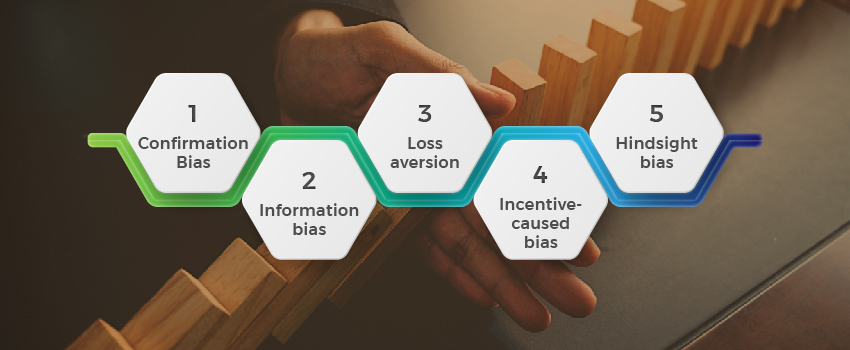It is a common perception that investing is all about having the right knowledge about the dynamics of the market, the sectors and ultimately the investible companies. However, knowledge is not the only thing that matters. Even the most knowledgeable investors may not be successful investors, if they are not able to control their emotions. Investing is not just about finding the right stocks, buying and selling them to make a profit. Finding the right stock is a very important step, but in addition to this, what ensures sustained success in investing, is control over behaviour and emotions.
In his book on Behavioural Investing, author James Montier touches upon such non-financial aspects in the field of investing. He highlights some of the most destructive behavioural biases and common mental mistakes often made by investors leading to investment losses. Appropriately, the book is titled ‘The Little Book of Behavioural Investing: How not to be your own worst enemy?’ With the help of examples not only from the world of investing, but also from life in general, James Montier explains the reasons for the existence of these mental pitfalls, and the ways in which investors could protect their portfolios by overcoming these biases.
The Human Brain – X-system and C-system:
According to psychologists, the X-system of the human brain makes decisions based on emotions. The X-system is automatic and effortless. The judgements made by the X-system are generally based on aspects such as similarity, familiarity and proximity (in time). The C-system of the human brain processes information in a more logical way. It attempts to follow a deductive, logical approach to problem solving and decision making.
We would like to believe that we make more use of our C-system. However, the reality is that the X-system handles far more of our actions that we would be comfortable to admit. In fact, very often we end up trusting our initial emotional reaction, and only occasionally do we recruit the C-system to review the decision. This is because the X-system is a quick and dirty way of finding answers, whereas the C-system requires detailed logical thinking. Investors are no exception to this, as they too rely heavily on the X-system. We do not have control over our urges, which is reflected in our actions when we make hasty buy and sell investment decisions. Legendary investor Warren Buffett has said that investors need to control their X-system. He says “Success in investing does not correlate with IQ once you are above the level of 100. Once you have ordinary intelligence, what you need is the temperament to control your urges that get other people in to trouble of investing.”
This book discusses various behavioural biases, and ways in which we could overcome them. We will talk about a few biases in this blog, and the remaining will be covered in our next blog.
In the Heat of the Moment – Plan, prepare and pre-commit:
In tough situations, humans often use their X-system to make decisions. They suffer from what James Montier calls, the empathy gap. Empathy gap is when, in response to a situation, a person behaves differently when in a calm state of mind and differently when in the heat of the moment. Poor decisions are made in the heat of the moment and better decisions are made when in a calm state of mind. Hence, it is essential that investors prepare, plan and pre-commit to a strategy. On the backdrop of such preparation and pre-commitment, an investor’s view and action towards a stock will not change in the heat of the moment (in case of frenzied selling or in the case of a mad rush to buy). One way to not be influenced by the heat of the moment is to have a wish-list of stocks and buy them only they reach the desired price, irrespective of the actions of other investors.
Why fear the Market?
It is not very easy to befriend the market, more so if you have suffered a loss. Fear of further loss causes people to ignore stocks when they are available at attractive prices. In such situations, people who use their X-system run out of self-control faster than those who use their C-system. They feel a state of temporary paralysis, wherein holding cash appears to be the best option. The solution to this is again pre-commitment. If you stick to your pre-committed strategy, and the fundamentals suggest you to buy, then you will buy only at an attractive price, and not take market driven decisions.
Let us not be over-optimistic, to the extent of being impractical:
Contrary to the above situation, when people see a positive movement in their investments, they tend to get over-optimistic. Over-optimism leads to illusion of control, wherein investors feel that they have a control over the outcome (which can never be the case in investing). Over-optimistic investors suffer from self-servicing biases. People having self-serving bias are prone to act in ways that are supportive of their own interests. Warren Buffett’s warning ‘Never ask a barber if you need a haircut’ best explains self-serving bias.
Stock Broker research generally conforms to three self-serving principles: –
- All news is good news (if it is bad, it can always get better).
- Everything is always cheap (even if you have to make up new valuation methodologies).
- Assertion trumps evidence (never let the facts get in the way of a good story).
To beat over-optimism, investors need to be sceptical about their investment decisions. So, one should ask the question ‘Why should I own this investment?’ instead of the often asked question ‘Why shouldn’t I own this investment?’
Stop listening to the ‘experts’:
Experts might be more knowledgeable about the market than normal investors, but this excess knowledge makes them over-confident Over-confidence often leads to bad decisions. Also, humans have an unfortunate habit of using confidence as a proxy for skill. They want people to sound confident. The more confident an expert sounds, the more people are likely to feel that the expert is correct. James Montier feels that we do not need to outsmart everyone else to be a successful investor. We need to stick to our investment discipline, ignore the actions of others, and stop listening to the so called ‘experts’.
The folly of forecasting:
It is not possible to predict the future. Past results are not a guarantee of future results. When our forecasts do not come true, we have several excuses (blaming the economy, the government, etc.). Since, we do not admit and give excuses, we continue making incorrect forecasts. Instead of spending time on forecasting (that, which cannot be forecasted), we should spend time to understand our current situation, our goals, and our strategy in the future. If we stick to our pre-committed strategy, we won’t make bad decisions by falling prey to faulty forecasting.
Information overload – Is more, better?
There is no dearth of information in the world of investing. Usage of lot of information makes just makes us more confident about our investment decisions, often leading to bad investment decisions. Investors get sucked in to action paralysis, where they won’t take action until they can analyse all the information, and by the time their analysis is done, the situation has changed. It is hard to believe that abundance of information is a not a good thing. More is not necessarily better. Most of the times, less is better. However, that less needs to be determined. There is no specific list of things one should look for. But it is essential to separate the sound from the noise. Investors should determine a few factors, pieces of information they will use to assess their investment choices. They should look for only such 5-6 factors rather than trying to make use of every piece of information available.
Turn off the television:
Many investors are stressed by little fluctuations in the stocks they have bought. The television is the key reason for this stress. If investors keep looking at the prices, and keep listening constantly to what reporters and experts have to say, they are likely to be influenced by them, and take hasty decisions. It is better to get rid of this habit of constantly looking at prices.
Let us not fall prey to our confirmatory biases:
Humans have the habit of looking for evidence that confirms the views they already have. This is known as confirmatory bias. For a stock that has caught an investor’s eye, he will try to find facts that will confirm his views. In the process, all information that is against the stock will be conveniently ignored, leading to bad investment decisions. While making investment decisions, we need to look for things that can go wrong with a potential investment candidate (probably our favourite stock). Hence, as mentioned earlier, the correct question to ask is ‘Why should I own this investment?’ instead of ‘Why shouldn’t I own this investment?’
The list of behavioural biases doesn’t end here. We will discuss a few more in our next blog.
Till then, let us know if you have been a victim to any of the biases mentioned above and how have you overcome them.
Disclaimer: This publication has been prepared solely for information purpose and does not constitute a solicitation to any person to buy or sell a security. It does not constitute a personal recommendation or take into account the particular investment objectives, financial situations or needs of an individual client or a corporate/s or any entity/ies. The person should use his/her own judgment while taking investment decisions.
If you liked what you read and would like to put it in to practice Register at MoneyWorks4me.com. You will get amazing FREE features that will enable you to invest in Stocks and Mutual Funds the right way.
Need help on Investing? And more….Puchho Befikar
Kyunki yeh paise ka mamala hai
Start Chat | Request a Callback | Call 020 6725 8333 | WhatsApp 8055769463










1 comment